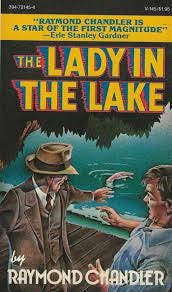The Last Exile is available for pre-order , and Ocean Drive is out now, in paperback and in audio read by Kyle Snyder!
I’m reading Lady in the Lake by Raymond Chandler, amazed that there’s a novel of his I haven’t read to death. In fact I’m not sure if I’ve ever read it. Maybe in my teens.
Lady is an interwar novel, with characters either home from WW2 or about to ship overseas. A lot of it takes placing outside of L.A., in Bay City and at a mountain community around Little Fawn Lake. But it also has the familiar Chandler archetypes, which include lousy wives, crooked cops, affable gangsters, diseased rich people, gigolos, and down on their PIs.
What a delight.
I will read pretty much any detective novel. A well-constructed detective novel, one with something to say about the world, is what I hope for. But the rarest and best quality in a detective novel is poetry, a lively turn of phrase and a considered use of language.
This is an exchange between Marlowe and the crooked cop that just beat up and arrested him:
“I thought they cleaned this town up,” I said. “I thought they had it so that a decent man could walk the streets at night without wearing a bulletproof vest.”
“They cleaned it up some,” he said. “They wouldn’t want it too clean. They might scare away a dirty dollar.”
“Better not talk like that,” I said. “You’ll lose your union card.”
He laughed. “The hell with them,” he said. “I’ll be in the army in two weeks.”
The incident was over for him. It meant nothing. He took it as a matter of course. He wasn’t even bitter about it.
Poetry is what sets the Chandlers and the damn few like him apart. People can ape his plots, they can improve on his worldview, they can add depth or shadings to his vision of the PI novel. And should. But they so rarely dive into language with anything close to his sense of care. Care and calculation and a certain playfulness. At least when he was at his best. Like Shirley Jackson or Daphne du Maurier in the horror genre, like Hillary Mantel or Patrick O’Brien in historical fiction, like John Le Carre in stories of espionage, there’s something unnecessarily good, good on the level of language.
And for Chandler there’s something else, too. Death,
The late Frederic Jameson’s Raymond Chandler: The Detections of Totality is 87 pages and sometimes pretty abstruse. But Jameson makes a great point about Chandler and death. In his travels through L.A., Philip Marlowe eventually reaches a place that stands “an evocation of death in all its physicality, when there is no longer any time to prepare himself for it properly, when he is obliged to take the strong sensation on its own terms.”
Marlowe’s journeys through the sprawl and corruption of ‘30s and ‘40s L.A. are punctuated by the sobering and undeniable reality of murder. His journey over the water to the gambling boats at the end of Farewell My Lovely, to the barren oilfields in The Big Sleep, and to Little Fawn Lake in Lady, are spaces where the earthy, always-present mortality becomes undeniable. Jameson uses the terms “History” and “World,” concepts from Heidegger, which I won’t pretend to fully understand. But I grasp the idea that for Chandler, language and mortality are different than for other writers.
I feel disillusioned sometimes, talking with authors who seem caught up in feedback loops of technology, marketing and self-mythology. AI and Amazon Ads and TikTok and selfies are not substitutes for caring about literature.
Poetry and death—what could be more essential to a great detective novel, or any novel, really? If you’re not going for that each time you pick up a book (or a pen), why bother?






Okay, need to reread Lady in the Lake... I read a snarky (or is it just ironic) blog post a few days ago that said, I summarize: "don't bother with style, best selling authors write bland". It was intended to get my hackles up and it did, of course. Simplicity of language doesn't mean flatness. Chandler writes clear and spare, so does Simenon, Bradbury writes fast, yet the poetry flows. But it's true, a lot of mega book sellers today strip away the soul in their rush to plot. I doubt they will ever be re-read.